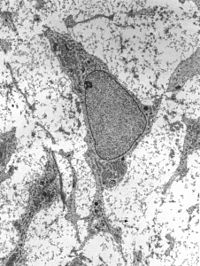
Photo from wikipedia
BACKGROUND Neo-vascularization, an indispensible phenomenon for tissue regeneration, facilitates repair and remodeling of wound tissues. This process is impaired in chronic wounds due to reduced number and recruitment of endothelial… Click to show full abstract
BACKGROUND Neo-vascularization, an indispensible phenomenon for tissue regeneration, facilitates repair and remodeling of wound tissues. This process is impaired in chronic wounds due to reduced number and recruitment of endothelial cells (ECs), thereby necessitating development of newer strategies to enhance the EC repertoire as a therapeutic approach. METHODS We explored the 'plasticity' of Wharton's jelly derived-mesenchymal stromal cells (WJ-MSCs) using an anti-inflammatory drug-mediated enhanced trans-differentiation into ECs, based on our observation of temporal decrease in COX-2 expression during trans-differentiation of MSCs into ECs at day 7 and 14 along with mature ECs. RESULTS At a physiological level, an increased DiI-labeled acetylated-low density lipoprotein (DiI-Ac-LDL) uptake, proliferation, migration and chick chorio allantoic membrane (CAM)-vasculogenesis occurred while at a molecular level significant up-regulation in messenger RNA (mRNA) and protein expression of endothelial-specific markers, Vegfr2, Pecam, eNOS, VE-Cadh and Tie-2, along with an activated p-VEGFR2 and its downstream mediators were observed in celecoxib-preconditioned ECs as compared with WJ-MSCs. Green fluorescent protein (GFP)-expressing stable WJ-MSCs and trans-differentiated EC-D14 in the absence/presence of celecoxib were generated using antibiotic selection for intradermal transplantation at the wound site on a murine 'excisional splinting wound' model. Engraftment of transplanted human cells in immunosuppressant-treated mice was confirmed by a significant increase in the expression levels of human gene-specific endothelial markers at the regenerated wound sites. Morphometrically, increased vascularity and percent wound closure were observed in regenerated wounds of mice transplanted with celecoxib-preconditioned-EC-D14. CONCLUSION Cox-2 inhibition led to an enhanced trans-differentiation of WJ-MSCs into ECs that, when transplanted, accelerated the skin regeneration by engraftment and neo-vascularization at the wound bed, suggesting a plausible new therapeutic role of celecoxib.
Journal Title: Cytotherapy
Year Published: 2019
Link to full text (if available)
Share on Social Media: Sign Up to like & get
recommendations!